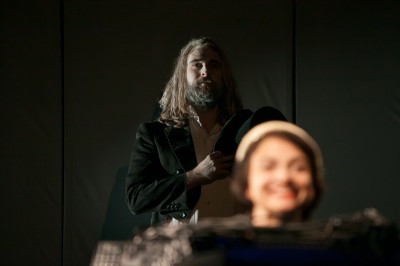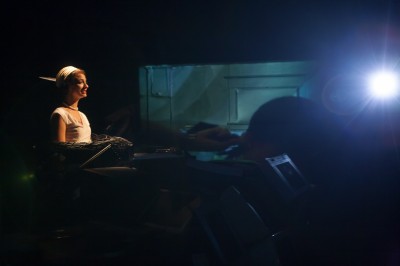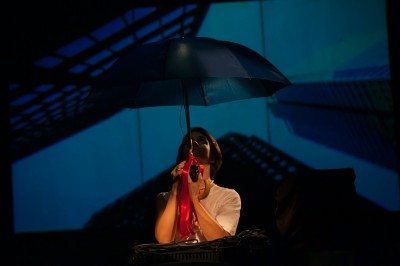Happy Days
Produced by: Theatre Y
An obvious statement of the human condition
Happy Days, Samuel Beckett’s 1961 play of fleeting hope and endless woe colliding with one another, is at the core a fascinating subject. However, the content undoubtedly worked a lot more to shake up an audience in 1961 than in 2014. Theatre Y in Logan Square attempts to bring this morose menagerie into the 21st Century with the use of broken down technology piled up to the waist of our heroine. I spent time admiring the craftsmanship of this mound of monitors before the play began, but of course a well-constructed set is not what makes the play. Truly, the set can only serve to enhance or hinder the experience.
The play opens to the startled awakening of Winnie (Melissa Lorraine), a woman piled high in trash. As she awakens, she begins her day. She goes on about how this will be a Happy Day as she removes various items from her very large bag of accessories. Presenting herself to the audience as if her crumbling life were a television show, Winnie begins to brush her teeth, check her hair, and she calls out to her husband Willie (Evan Hill). Willie, a man of few words, is presented to us only when he decides to come out of his hole in the ground. A literal hole. As Winnie feels her hope fade even further that this will be a Happy Day, she desperately calls out to Willie again. He leaves his hole and sits on a bench, his back to the audience. A bloody wound on the back of his head, his blonde hair fading into more of a light gray, a blood-stained rag placed on his head under a large Top Hat. Shirtless, he sits on his bench and retrieves a yellowed old newspaper, worn and clearly not up to date, and begins reading random snippets of the text. Shouting them with his bold and powerful voice. Winnie continues to talk to Willie, but really more to herself as she continues on about how important it is to be happy and how she pines for the old times in a less cynical world. The first act comes to a close as Winnie is enveloped by flashing TV programs all around her.
Immediately following this the second act begins with Winnie now buried up to her head in broken down junk. She speaks much faster now, frantically trying to get Willie to talk to her as she struggles to stay awake. Reciting a cryptic and formulaic series of words that seem to be memorized as if saying them will make everything seem OK. She dozes off, the alarm immediately wakes her. She continues to recite her speech. She falls asleep again. The alarm comes again. This is repeated throughout her speech until Willie rises from his hole, dressed in a somewhat Victorian funeral suit, and he pulls Winnie from the wreckage. The show fades to black, we come back, and Willie and Winnie take their bow.
Andros Visky directed this production of Happy Days for Theatre Y. The dissonant and ominous sound design was presented to us by Jackie Triste. In addition to playing Winnie, Melissa Lorraine was also the artistic director for this production. The set, which I did think was masterfully crafted, was designed by Peter Szabo, and constructed with the help of his crew. In addition to the design of the set, I feel that the Master Electrician (Robert Hornbostel) deserves recognition for this set in particular. A lot of thought goes into a design like this, especially with still working monitors.
I didn’t hate the production. I felt it was somewhat meaningless, though. Happy Days is just another pretension art play trying desperately to capture the decline of western civilization due to technology. I feel I’ve heard that topic done to death, both on stage and on screen. The performance was fine, although a bit unrealistic. I do believe this was intentional, though. Presenting Winnie as someone who is really just acting. Acting like everything is OK when life is literally crumbling beneath her. Still, I think I would have preferred a more honest approach to the dialogue. It makes relating to these anomalies so difficult.
As I mentioned, I feel that this content must have made a much bolder statement in 1961, but the world we live in today is far too cynical already. This script doesn’t make today’s audience think, but rather just agree. I feel that Beckett’s efforts were to shake up an audience and get people to think differently, not to pander to an audience about an already agreed upon statement. Despite everything else, it was an interesting play with a coherent message. Personally, I didn’t love it, but I’m sure a lot of people would. Still, there are certain things that should be left to their time, and I feel that though the statement is still true, the sentiment is not, and Happy Days should have stayed behind.
Somewhat Recommended
John Stuckert
Reviewed October 27, 2014
Playing at Theatre Y’s residency space at St. Luke’s Lutheran Church. 2649 N Francisco, Chicago, IL. For more information, visit https://www.theatre-y.com//; tickets can be purchased at www.theatre-y.ticketleap.com or by calling (773) 977-7873. Happy Days is 80 minutes long in 2 acts with no intermission. The show runs on Thursdays-Sundays at 7:30 PM from October 17-November 23, 2014. Tickets are $20, $15 for students and seniors.




